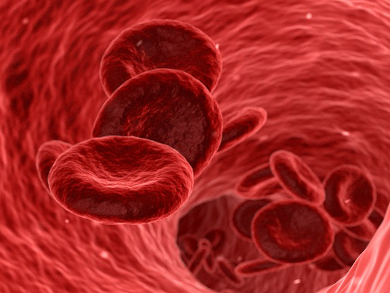Chronic myeloid leukemia (CML) is a cancer resulting from the aberrant and uncontrolled growth of blood-forming myeloid cells in the bone marrow. These cells eventually enter the blood stream and populate distant organs, negatively affecting healthy resident cells. In CML, increased cancer-typical cell division is associated with a characteristic chromosomal translocation (Philadelphia Chromosome/ Ph+) that generates an oncogenic tyrosine kinase fusion-gene called BCR-ABL1. This genomic aberration was also observed in Ph+ acute lymphocytic leukemia (ALL).
Over the last decade, the development of targeted chemotherapeutic drugs, so-called tyrosine kinase inhibitors (TKIs), for example, Imatinib, Nilotinib, and Dasatinib, has improved long-term survival rates and quality of life in leukemia patients with defective tyrosine kinase signaling. Although those drugs significantly improved patient response when administered as monotherapy, they have limitations for patients with acquired drug resistance caused by mutations in the structure of the BCR-ABL1 gene.
Andrew Wylie, Novartis Institutes for BioMedical Research, Cambridge, MA, USA, and colleagues have explored the mode of action of a selective allosteric ABL1 inhibitor (ABL001) as a potential therapeutic agent for the treatment of CML and Ph+ ALL. In contrast to TKIs that mechanistically target the ATP-pocket, ABL001 binds to the myristoyl pocket of ABL1. The researchers hypothesize that a dual targeting of BCR-ABL1 may provide a novel therapeutic option for patients intolerant to therapy with TKIs due to single point mutation-associated treatment resistance.
By using in vitro cell line models that contain BCR-ABL1 oncogenic gene fusions with distinct point mutations, the researchers probed the treatment efficacy of ABL001 as a single agent and in combination with other TKIs. Indeed, CML xenograft tumors were eradicated after combinatorial treatment with ABL001 and Nilotinib and no recurrence was observed. A Phase I clinical study in patients with CML or Ph+ ALL and ABL001 mono and combinatorial treatment was launched by Novartis Pharmaceuticals.
- The allosteric inhibitor ABL001 enables dual targeting of BCR–ABL1,
Andrew A. Wylie, Joseph Schoepfer, Wolfgang Jahnke, Sandra W. Cowan-Jacob, Alice Loo, Pascal Furet, Andreas L. Marzinzik, Xavier Pelle, Jerry Donovan, Wenjing Zhu, Silvia Buonamici, A. Quamrul Hassan, Franco Lombardo, Varsha Iyer, Michael Palmer, Giuliano Berellini, Stephanie Dodd, Sanjeev Thohan, Hans Bitter, Susan Branford, David M. Ross, Timothy P. Hughes, Lilli Petruzzelli, K. Gary Vanasse, Markus Warmuth, Francesco Hofmann, Nicholas J. Keen, William R. Sellers,
Nature 2017.
DOI: 10.1038/nature21702




